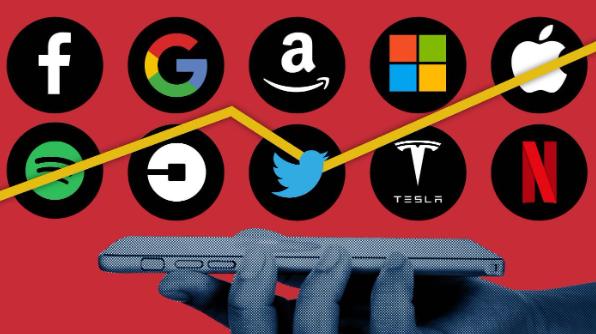
The Volatile Year for Big Tech
Getting up to speed with the challenges of Big Tech companies like Netflix, Amazon and Twitter, and peeking in the direction of 2023.
Big Losses for Big Tech
Huge market cap companies like Amazon, Netflix, Alphabet, and Apple saw their shares excel beyond expectations in 2021. In 2022, however, “Big Tech… risks losing its luster for investors that have bet on these thoroughbreds for the past decade”, explains Dan Ives of Wedbush. By the start of November, Amazon shares were down 40% year-to-date, Alphabet shares 36%, Netflix 50%, and Apple 15%. As to Meta Platforms, after an unexciting earnings report at the end of October, shares fell a massive 24%, bringing their year-to-date losses to a crushing 70%. The rose among the thorns was Twitter, whose shares boasted year-to-date gains of 25%. If you’re interested in the shifts and changes happening in the world of financial trading, or if you follow these companies’ share price movements for CFD trading online with iFOREX platform tools, join us for a closer look at some of the biggest companies in the world.
Netflix
“If there’s a unifying narrative for Netflix in Q4 2022, it’s that the worst appears behind it”, says Steven Cahall of Wells Fargo. The first half of 2022 saw the video-streaming company lose 1.2 million viewers, but they had a solid array of fresh programs to present in Q3 and revenue went up 5.9%, beating expectations. In addition, 2.41 million new customers signed up in the quarter and the company noted growth in all of its markets. Shares got a 13% boost to reach $271.39 in the latter half of October. “Thank God we’re done with shrinking quarters”, remarked cofounder Reed Hastings. However, with a purported advertising plan within the Netflix platform on the way, it will be interesting to see how Netflix shares react.
Samsung
When the Ukraine conflict and pandemic lockdowns interfered with memory chip supplies this year, huge stockpiles gathered up to meet the pent-up demand. Consumers, however, faced with mounting inflation and the threat of recession, have been wanting fewer of the PCs and smartphones that carry the chips. Also, with elevated oil prices and interest rates, consumers have been cutting down on purchases in general. “It’s hard to expect demand recovery at this point”, said Lee Seung-Woo of Eugene Investment and Securities at the end of October. Unlike other chipmakers, Samsung did not decide to hold back on production despite the drop in chip price-tags. The company’s Q3 revenue was lower than analysts anticipated, and they only expect to recover in the latter half of next year.
Amazon
Moving into November, Amazon said they believed sales in the upcoming holiday season would be slow due to weak consumer demand, hot inflation, and high fuel costs. Shares fell a hefty 21% in response to the report, bringing losses for the year so far to 33% for the company that’s been feeling the impact of a consumer withdrawal from e-commerce. Amazon founder Jeff Bezos lost $58 billion in the first ten months of 2022.
When Twitter shares were first publicly traded in 2013, prices rallied 73% on the day. Since then, Twitter has battled to expand their user base and growth per year has been only 8.4%, lower than the S&P 500’s 11%. “There’s no question it has never lived up to what investors had hoped for when it went public”, says Alec Young of MapSignals. 2022, by contrast, has seen big share price gains for the company, setting it apart from its peers. At the time of Elon Musk’s takeover on October 28th, its share price of $54.20 didn’t compare with the $77 achieved during the tech rush of March 2021, but “it’s well above the $32 the company was being traded at a year later”, pointed out Susannah Streeter of Hargreaves Lansdown.
Meta
On the last day of October, tech stocks went into decline, with the Nasdaq 100 down 1.2%, but Meta’s share losses were as much as 6.1%. This brought losses for the week up to 24%, which made this crash bigger than the 21% downturn in February. Analysts say the main obstacle facing the stock has been the CEO’s single-minded focus on developing the metaverse. The company used to rake in most of its revenue through ad sales on their social media platform. “The stock could double in a year with better management, with management that is more focused on shareholders”, suggests David Katz of Matrix Asset Advisors. Mark Iong of Homestead Advisors, however, believes that, considering the CEO’s successful track record with WhatsApp, Instagram, and Facebook, “I think he’s earned the right to pursue his long-term strategy”.
Looking Forward
For readers involved in trading online with iFOREX platform-based CFD trading, some things to keep an eye on include Elon Musk’s progress in changing strategy at Twitter, Covid lockdowns in China, which could disrupt supply chains, and any loosening of the US Federal Reserve’s hawkish monetary policy, which could spur risk appetite. And before trading online with iFOREX platform tools, be sure to take advantage of the broker’s wide array of educational materials including trading guides, video tutorials, and 1-on-1 training sessions with a live trading coach.


























